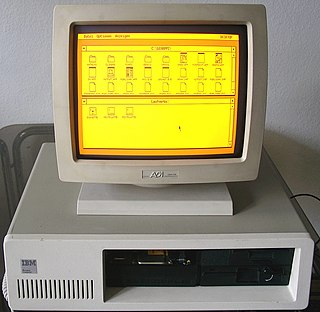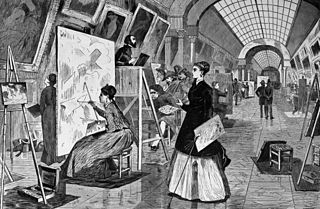Related Research Articles

Atari ST is a line of personal computers from Atari Corporation and the successor to the company's 8-bit home computers. The initial model, the Atari 520ST, had limited release in April–June 1985, and was widely available in July. It was the first personal computer with a bitmapped color graphical user interface, using a version of Digital Research's GEM interface / operating system from February 1985.

GEM is a discontinued operating environment released by Digital Research in 1985. GEM is known primarily as the native graphical user interface of the Atari ST series of computers, providing a WIMP desktop. It was also available for IBM PC compatibles and shipped with some models from Amstrad. GEM is used as the core for some commercial MS-DOS programs, the most notable being Ventura Publisher. It was ported to other computers that previously lacked graphical interfaces, but never gained traction. The final retail version of GEM was released in 1988.

FreeDOS is a free software operating system for IBM PC compatible computers. It intends to provide a complete MS-DOS-compatible environment for running legacy software and supporting embedded systems.

LilyPond is a computer program and file format for music engraving. One of LilyPond's major goals is to produce scores that are engraved with traditional layout rules, reflecting the era when scores were engraved by hand.
Finale is a proprietary music notation software developed and released by MakeMusic for Microsoft Windows and macOS from 1988 until 2024, when it was discontinued.
A scorewriter, or music notation program is software for creating, editing and printing sheet music. A scorewriter is to music notation what a word processor is to text, in that they typically provide flexible editing and automatic layout, and produce high-quality printed results.
Emagic was a music software and hardware company based in Rellingen, Germany and a satellite office in Grass Valley, California. On July 1, 2002 Emagic was bought by Apple Computer. Emagic's Windows-based product offerings were discontinued on September 30, 2002.

Music engraving is the art of drawing music notation at high quality for the purpose of mechanical reproduction. The term music copying is almost equivalent—though music engraving implies a higher degree of skill and quality, usually for publication. The name of the process originates in plate engraving, a widely used technique dating from the late sixteenth century. The term engraving is now used to refer to any high-quality method of drawing music notation, particularly on a computer or by hand.

Cinemaware was a video game developer and publisher. It had released several titles in the 1980s based on various film themes. The company was resurrected in 2000, before being acquired by eGames in 2005.
capella is a musical notation program or scorewriter developed by the German company capella-software AG, running on Microsoft Windows or corresponding emulators in other operating systems, like Wine on Linux and others on Apple Macintosh. Capella requires to be activated after a trial period of 30 days. The publisher writes the name in lower case letters only. The program was initially created by Hartmut Ring, and is now maintained and developed by Bernd Jungmann.
Optimized Systems Software (OSS) was a company that produced disk operating systems, programming languages with integrated development environments, and applications primarily for Atari 8-bit computers. The founders of OSS previously developed Atari DOS, Atari BASIC, and the Atari Assembler Editor for Atari, Inc., and many OSS products are substantially improved versions. OS A+ and DOS XL are based on Atari DOS. BASIC A+, BASIC XL, and BASIC XE are based on Atari BASIC. EASMD and MAC/65 are modeled on the Atari Assembler Editor. Action! is an ALGOL-inspired compiled programming language with an integrated full-screen editor. OSS also sold some software for the Apple II.
Raster graphics editors can be compared by many variables, including availability.

A copyist is a person who makes duplications of the same thing. The modern use of the term is mainly confined to music copyists, who are employed by the music industry to produce neat copies from a composer or arranger's manuscript. However, the term is sometimes used for artists who make copies of other artists' paintings.

Overture is a music notation (scorewriter) program for Windows and Macintosh platforms, published and developed by Sonic Scores. While Overture is primarily a scorewriter program, it also allows editing the score's MIDI audio playback data in the manner of sequencer and digital audio workstation (DAW) software.
This is a comparison of music notation programs.

Dorico is a scorewriter software; along with Finale and Sibelius, it is one of the three leading professional-level music notation programs.
References
- ↑ "Manuscript Writer home page". ssb22.user.srcf.net. Retrieved 27 April 2023.
- 1 2 Rothman, Philip (2024-08-26). "MakeMusic ends development and availability of Finale; partners with Steinberg to sell Dorico directly [updated]". Scoring Notes. Retrieved 2024-08-27.
- ↑ Styled 4 Clocksin.com [ dead link ]
- ↑ "Archived copy" (PDF). Archived from the original (PDF) on 2016-05-02. Retrieved 2018-03-05.
{{cite web}}: CS1 maint: archived copy as title (link)